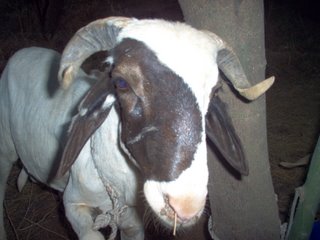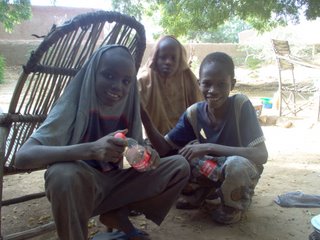I recently took a two day excursion en brusse with Radio Dande Douentza to do some animations in two rural villages, one Dogon and one Peulh. First, let me explain the purpose of the animation. The animations are a way of teaching and informing the public different topics insofar as health, agriculture, democracy, etc. are concerned. So, Radio Daande Douentza, in collaboration with PDIHK-MELM, another NGO, got together and made this animation and visited these two villages. They made it into a type of game and brought prizes to the participants and winners. Soap, flashlights, batteries, shoes, cloth and salt were the prizes. The question that was posed was, “There a big tree in your village that can provide a lot nutrients and good things in your life, but it’s sick. If it dies, it will be a huge catastrophe for the village because you’ll lose all of these things. What do you do and who do you call?” People offered answers of the doctor, women, the Project who works with the village. After this question, based on the answers given and those who produced the right answer (which was apparently Doctor, tree doctor maybe?), the list was narrowed down and more in depth questions were asked, the details of which I didn’t understand. By the end, the winners were chosen by who had the correct answer and who gave the most convincing display of their knowledge. Now, the great thing is that just because only a couple of people had the correct answers and won prizes, the entire community was able to benefit from the knowledge and learn the right things to do in certain situations. So, all in all, I think that these animations/public service announcements are a really great benefit to the communities here, especially when they deal with pressing issues such as health and AIDS or even agricultural ways to improve the land. It’s a different way of informing the public, but I think it works all the same.
The problem with this two day trip is that it was scheduled on "West African International Time" (WAIT) not on "Sara's used to things being timely in America" time. So, Monday morning I woke up early and got ready and went to the Radio. Boucary said the vehicle was leaving at 8 or 8:30, which I knew meant like 10, but I wanted to check email, etc. I surfed the web until 10, and then took a nap. Needless to say, time wasn’t pressing and we didn’t actually leave until 2 PM, putting all of our alleged “program” off quite a bit. The ride there wasn’t too bad, it was on the guidrone for awhile and then off the guidrone, going to the Dogon village Diamaga. It was still kind of a road when we traveled there so I thought this is how brussy villages were. I was so wrong. When we got there, I got out and said hello and we took all of our baggage out and all this stuff. Jiawara and Amadou Pulo stayed there, but Boucary said there was some business to take care of and I could come to see the landscape if I want, which I wanted to. So, I got in the car, but in the back this time, and the problem was that the driver was a maniac and went really fast over these holes in the ground. Well, I wound up flying out of my seat and I hit my head on the roof. But immediately after I hit my head, my spine felt a little funny. So, I’m hoping there aren’t any irreparable damages there, because that would be really bad. Anyway, so I thought we were on this short little trip, but it turned out to be Indiana Jones meets Mali and the Falaise going to Boni.

Photo taken in the car on the Indiana Jones Adventure
We had to pick up this generator and other stuff and I wanted to kill myself. We weren’t on a road, but rather a path that has been cleared by one or two vehicles that pass by and maybe some bikes and motos. It was crazy. After an hour of wishing I had stayed at the Dogon village, we arrived in Boni and got the stuff and headed back – even more challenging because it was getting dark and we didn’t take the same route – because it’s not actually a road! – and I think it took longer than it should have. So then Boucary and Amadou set up the electricity and we ate some and then the show started. It was cool because it was there were traditional Dogon’s dancing and singing and then all of these kids around waiting for the animation-like stuff to happen. It took awhile! I mean, WAIT is nuts. We probably started around 8 PM, or later, and the show didn’t end until after midnight. When we finally ended, I was happy because I could go to sleep. Unfortunately, we packed more people than could fit in the car and then headed back to Boni and then off to some other random village to sleep. I wasn’t really too happy about this, but whatever, what choice did I have? So, long story short, it took us until after 3 AM to get to our destination at which time, I set up camp, ate a couple bites of food, and hit the sack. The guys felt the need to talk and I wanted to murder them, but I resisted and finally fell asleep. They told me that I could sleep until noon because there was nothing to do, however woke me up surprisingly early to eat. So, we ate and then Boucary left somewhere (Boni, I think) to get more stuff. When he told me the program didn’t start until noon, I thought he would be back at noon and we’d start the animation at the next village. However, I laid around all day and read Segu and they didn’t get back until like 4 PM. WHAT! Oh, that's right, WAIT again! So, we packed up the car and went to Feto Sambo, a traditional Peulh village. It was around 5 PM, still light out and it was cool because I got to look around a bit.

Feto Sambo Peulh Kids

My Favorite Photo - Peulh huts in the back, and cow shit everywhere - with a Peulh herder and his Peulh hat!
They only have the Peulh huts there, but I finally went inside of one and it’s really interesting. In the two I entered, there was a big bed and not much more. But, they’re raised off of the ground on pretty elegant beds, and it was great. A lot of the kids were afraid of me, which is amusing but not at the same time. I tried to touch one, and she freaked out and ran away. So, that was the end of that. For once, I hung out with only the women and girls. They were enthralled by me and me by them. Like I said, it was traditional, and they all had their noses/septum pierced, and their mouths tattooed and wore the gold earings and had their braids done very Peulh-like. It was just great. I wanted to take profile shots of each of them, but that’s kind of weird, n’est pas? So, we hung out for awhile and then it got weird because I don’t speak Peulh yet and I went and read my book waiting for the animation to start. I assumed, obviously incorrectly, that we would be done really early and get home early, etc. The animation ended pretty early, but I didn’t get home until 1 AM.
So, based on all of this WAITing and mismanagement of time and life on Monday and Tuesday, I decided that the Radio and I need to have a meeting and talk about some things, being that I'm their consultant. Also, I never, EVER, want to go en brusse with them again. I think I'll leave the brussy adventures to the Guide's Association!
 Sweet and happy sheep, before 9 AM. We didn't kill them all, don't worry!
Sweet and happy sheep, before 9 AM. We didn't kill them all, don't worry!
















